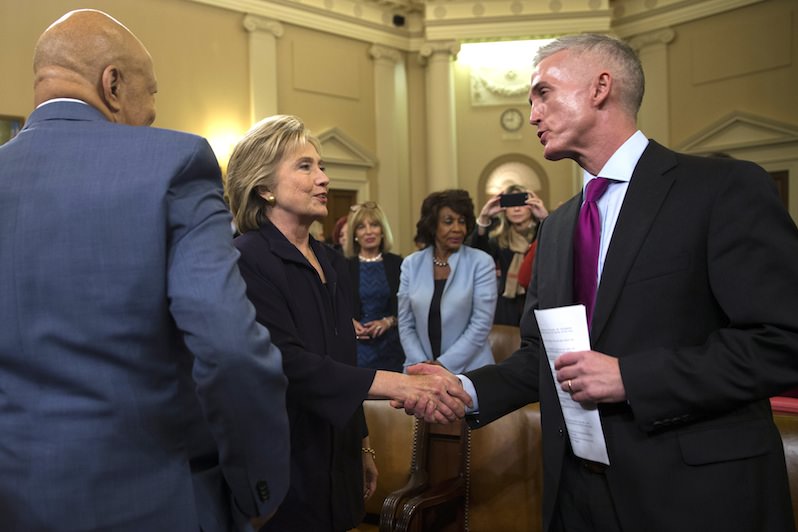Benghazi Hearing Was a Self-Defeating Travesty
Hillary Clinton must have been mindful of the old adage that you never interrupt an enemy when he is making a mistake. She sat in the witness chair with the patience of Job, hour after endless hour, while the House Select Committee on Benghazi did all it could to make her our next president. Hillary Rodham Clinton, Democratic presidential candidate and former secretary of state, shakes hands with Rep. Trey Gowdy, R-S.C., chairman of the House Select Committee on Benghazi, at the conclusion of Thursday's hearing on Capitol Hill. (Evan Vucci / AP)
Hillary Rodham Clinton, Democratic presidential candidate and former secretary of state, shakes hands with Rep. Trey Gowdy, R-S.C., chairman of the House Select Committee on Benghazi, at the conclusion of Thursday's hearing on Capitol Hill. (Evan Vucci / AP)
Hillary Clinton must have been mindful of the old adage that you never interrupt an enemy when he is making a mistake. She sat in the witness chair with the patience of Job, hour after endless hour, while the House Select Committee on Benghazi did all it could to make her our next president.
READ: An Idiotic GOP Is Looking at the Wrong Thing in Its Clinton Probe
How much of a self-defeating travesty was last week’s hearing for the Republican Party? The answer is obvious from how quickly the GOP has sought to turn the page.
Had a glove been laid on the presumptive Democratic nominee, the Sunday talk shows would have been a jamboree of Clinton-bashing. As it was, chief inquisitor Trey Gowdy, R-S.C., could only grumble on “Meet the Press” that Clinton’s testimony lacked “wholeness and completeness,” by which he seemed to mean she failed to make a case against herself. Gowdy also said he regretted that the hearing was held publicly rather than behind closed doors.
Among the Republican presidential contenders, the most deliciously ironic reaction came from New Jersey Gov. Chris Christie, who claimed Clinton was “unaccountable” because she left the Benghazi compound’s security arrangements to be handled by lower-ranking State Department professionals. As “Face the Nation” host John Dickerson pointed out, Christie gave a similar explanation to exonerate himself in the George Washington Bridge scandal.
Front-runner Donald Trump more wisely chose a pox-on-both-houses approach, observing in a CNN interview that the hearing was “very partisan” and “the level of hatred between Republicans and Democrats was unbelievable.” He used the occasion to paint himself as a “great unifier,” which will come as a surprise to the beleaguered GOP establishment.
Gowdy was chosen to head the Benghazi committee because of his experience as a prosecutor. Maybe he’s better at real trials than show trials. Presiding over Thursday’s marathon farce, he was a disaster.
His biggest mistake was failing to foresee the dynamics of the hearing: It was always likely that Clinton, not the committee, would dominate the room.
After all, this was hardly Clinton’s first rodeo. With all her experience at congressional hearings, both asking and answering questions, she knew it was the witness who had ultimate control over pace and tone. However aggressive the Republicans were in firing their questions, she answered calmly, slowly, almost sweetly. She was like a tennis player who just keeps lobbing the ball back across the net until her opponent becomes frustrated and makes a mistake.
Gowdy appeared to orchestrate the hearing so that his one tidbit of new information was revealed late in the day, when Clinton might be tired and more likely to stumble: a previously unreported email to her daughter, Chelsea, blaming the Benghazi attack on terrorists at a time when other administration officials were saying it began as a spontaneous demonstration.
But the committee member assigned to confront Clinton with the email was Rep. Jim Jordan, R-Ohio, and it was he, not the witness, who seemed cranky and out of sorts. Perhaps the pressure of heading the Freedom Caucus of rejectionist House Republicans is getting to him.
Clinton explained that she wrote the email in question after the terrorist group Ansar al-Sharia reportedly claimed credit for the attack — but before that same group denied responsibility. Jordan ignored Clinton’s response and went on sputtering about an allegedly “false narrative.”
Clinton had already won the narrative contest, however. Hours earlier, she told the riveting story of how, as the Benghazi diplomatic compound burned, State Department security personnel desperately searched through thick black smoke for diplomat Sean Smith and Ambassador J. Christopher Stevens. They found Smith’s body but did not know for many hours that Libyans had taken Stevens to a hospital and tried, but failed, to revive him.
Gowdy’s committee couldn’t decide exactly what Clinton was supposed to have done wrong. At times, they suggested she was too detached; at other times, they accused her of micromanagement. The fact that a friend and former aide named Sidney Blumenthal sent Clinton a number of self-important emails is somehow unforgivable, I gather, although committee members were at pains to explain why.
In a hearing that began at 10 a.m. and ended 11 hours later, hardly any time was spent on the one legitimate issue arising from Benghazi: the wisdom of U.S. policy in Libya. U.S. military support helped oust a brutal dictator. But we also helped create a failed state where terrorism quickly took root.
Does Clinton have any second thoughts? Maybe a serious committee will ask her someday.
Eugene Robinson’s email address is [email protected].
© 2015, Washington Post Writers Group
Your support matters…Independent journalism is under threat and overshadowed by heavily funded mainstream media.
You can help level the playing field. Become a member.
Your tax-deductible contribution keeps us digging beneath the headlines to give you thought-provoking, investigative reporting and analysis that unearths what's really happening- without compromise.
Give today to support our courageous, independent journalists.






You need to be a supporter to comment.
There are currently no responses to this article.
Be the first to respond.